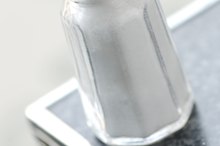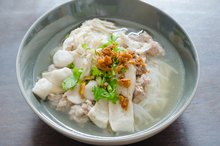Iodine Free Diet Foods
Iodine is a mineral that contributes to thyroid gland function. Your doctor may suggest a low-iodine diet if you have thyroid cancer or before a medical test called a radioactive immunoassay. According to "Essentials of Thyroid Cancer Management," by Robert J. Amdur and Ernest L. Mazzaferri, it is difficult to determine the specific iodine content of foods, since it is affected by soil and other environmental factors. However, particular foods are considered low-iodine. A low-iodine diet generally limits iodine to 50 milligrams per day.
Starches
Starches provide glucose--the body's primary energy source. Since commercially prepared breads, cereals, crackers typically contain rich amounts of iodine, the Ohio State University Medical Center recommends homemade breads as allowable starches while following an iodine-restricted diet. You may also enjoy cereals, such as cream of wheat, oatmeal and shredded wheat, and barley, and most pasta. Flour is also permitted, so preparing your own crackers and other baked goods may prove helpful.
Fruits and Vegetables
Can I Eat Seaweed If I Have Hyperthyroidism?
Learn More
Fruits and vegetables provide valuable amounts of vitamins, minerals, fiber and water. Fortunately, all fresh fruits are low in iodine. Fresh vegetables are low in iodine as well, except for potatoes, legumes and soy products. The Ohio State University Medical Center suggests avoiding all canned and frozen vegetables that contain salt. You may enjoy all pure fruit juices and canned fruit varieties, except for those that contain red dye, such as fruit cocktail blends and maraschino cherries. To ensure low iodine content, check food labels on all packaged fruits and vegetables before consuming them.
Protein-Rich Foods
Protein supports lean tissue development, tissue repair and sustained energy levels. While dairy products, fish and processed meats contain dense amounts of iodine, numerous protein-rich foods do not. Choose natural, unsalted meats, as beef, veal and lamb, and poultry, such as turkey and chicken. Pork, veal and peanut butter are also valuable, low-iodine sources of protein. If you are following a low-fat diet or have high blood pressure, the American Heart Association recommends avoiding organ meats, aiming for leanest cuts of meat and trimming visible fat and skin from poultry.
Fats
Low-Iodine, High-Protein Diet
Learn More
Though dense in calories compared to other foods, fat sources, such as oils, nuts and seeds, provide valuable nutrients. Fat also supports nutrient absorption, cell growth and brain function. According to Ohio State University Medical Center, most fat sources aside from butter, including most oils, margarine and unsalted nuts and nut butters fit well within a low-iodine diet.
Related Articles
References
- "Essentials of Thyroid Cancer Management"; Robert J. Amdur, Ernest L. Mazzaferri; Oct. 2005
- American Heart Association: Cooking for Lower Cholesterol
Writer Bio
August McLaughlin is a certified nutritionist and health writer with more than nine years of professional experience. Her work has been featured in various magazines such as "Healthy Aging," "CitySmart," "IAmThatGirl" and "ULM." She holds specializations in eating disorders, healthy weight management and sports nutrition. She is currently completing her second cookbook and Weight Limit—a series of body image/nutrition-related PSAs.









